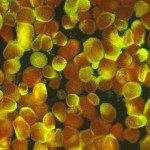Link to Pubmed [PMID] – 9203960
Immunology 1997 May;91(1):13-9
The cloning and production of a human anti-rhesus (Rh) D monoclonal antibody (mAb) using the baculovirus-insect cell expression system is described. This monoclonal recombinant antibody R.D7C2 derived from a human parental IgM lambda immunoglobulin was obtained after immortalization of lymphocytes by Epstein-Barr virus (EBV). The human heavy (VH) and light (VL) variable regions were cloned from the parental cell line and genetically fused to the human constant IgG1 heavy (H) and light (L) chain genes (gamma 1 and lambda, respectively). A recombinant baculovirus was constructed that directs the co-expression of genes encoding both genetically fused heavy and light chains under the control of two late and strong baculovirus promoters. After infecting the Spodoptera frugiperda (Sf9) insect cell line with this baculovector, a complete IgG1 mAb was secreted in the culture medium indicating that each immunoglobulin chain was correctly processed and assembled with a functional glycosylation into a tetrameric form. In vitro analysis showed that the functional properties of R.D7C2 using agglutination tests were efficient for the specific recognition of Rh-D-positive red blood cells (RBC). In addition, R.D7C2 showed effector functions of the gamma 1 heavy chain resulting in the lysis of Rh+ papain RBC by an antibody-directed cellular cytotoxicity mechanism. These results demonstrate that R.D7C2 can be produced in the baculovirus-insect cell expression system as a source for potential therapeutic application in the treatment of the haemolytic disease of the newborn.

